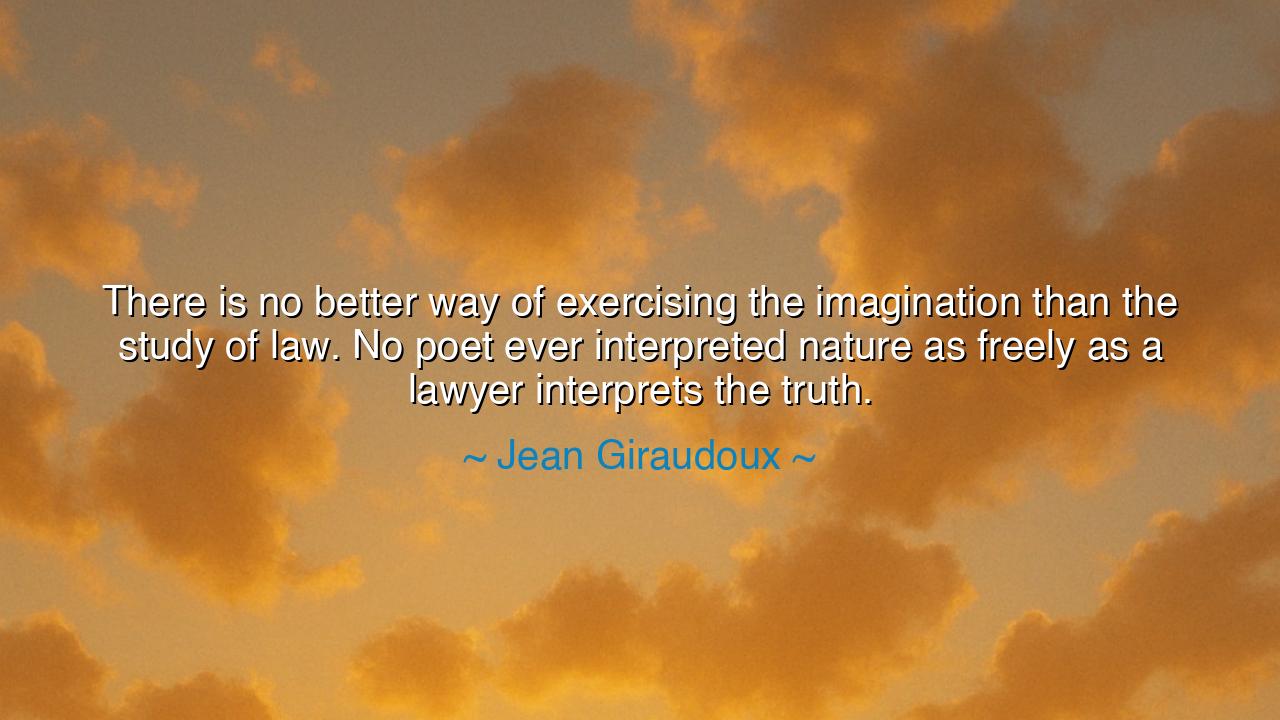
There is no better way of exercising the imagination than the
There is no better way of exercising the imagination than the study of law. No poet ever interpreted nature as freely as a lawyer interprets the truth.






"There is no better way of exercising the imagination than the study of law. No poet ever interpreted nature as freely as a lawyer interprets the truth." Thus spoke Jean Giraudoux, a dramatist and diplomat of the modern age, whose pen was as sharp as his wit. In this saying, hidden beneath its irony and grace, lies a profound reflection on the human mind—its power to twist, to justify, to reimagine the world through words. He saw in law not only the cold machinery of justice, but the grand theater of imagination itself, where truth bends and reforms under the weight of intellect and persuasion. For what is law, if not a mirror of human reasoning—endlessly interpreting the infinite shades between right and wrong?
In the ancient days, the poets sang of gods and heroes, and through their verses they sought to interpret nature—to reveal the mysteries of thunder, love, and fate. Yet Giraudoux, with a knowing smile, declared that the lawyer, not the poet, is the true interpreter of the modern world. The poet gives beauty to the uncertain; the lawyer gives certainty to the ambiguous. The poet imagines freely; the lawyer imagines strategically. Each statute, each clause, each precedent becomes a line of verse to be rearranged, transformed, and woven into new meaning. Thus, in the courtroom and in the study, the imagination of the lawyer is not idle fancy—it is a living force, shaping how men perceive truth itself.
Consider the trials of history, where words determined the fate of nations. In ancient Athens, the orators—Lysias, Demosthenes—stood before their peers and crafted truth from argument. They were not mere speakers; they were architects of belief. By the brilliance of their rhetoric, they made the unjust appear noble and the noble seem suspect. So too in later ages, kings and courts employed the law to justify conquest, to sanctify greed, or to defend liberty itself. It was through law that tyranny cloaked itself in righteousness—and through law again that justice tore away the veil. Truly, Giraudoux saw clearly: no art demands a greater exercise of imagination than the art of interpreting law.
There is a tale from more recent times that illustrates this well. In the United States, a lawyer named Thurgood Marshall stood before the Supreme Court to argue against the chains of segregation. The law of the land, written and accepted for generations, declared separation “equal.” Yet Marshall, guided by both reason and imagination, read into the Constitution a truer truth—that equality without unity was a lie. He saw in the dry words of law the beating heart of justice, and through his vision, the law itself was reborn. Thus, the imagination that once chained truth was turned to liberate it.
But Giraudoux, with the poet’s wisdom and the cynic’s smile, also warned of the other face of this power. For the same imagination that can reveal truth can also distort it. The lawyer’s brilliance is both torch and shadow—his argument can illuminate, or it can deceive. When the love of victory outweighs the love of truth, the imagination becomes a cunning serpent, twisting justice into justification. Then law becomes theater, and truth a performance. It is here that the poet and the lawyer diverge: the poet imagines to express beauty; the lawyer imagines to persuade. Both craft illusions, but one serves wonder, the other power.
And yet, let us not despise this paradox. For it teaches a greater lesson about the nature of truth itself—that it is not a fixed stone, but a living flame. Every human heart, when faced with conflict, interprets truth in its own way. The law merely magnifies this universal struggle. To study law is to study the soul’s capacity for invention—to see how reason and imagination dance together, shaping the destiny of men. Thus, the study of law, when guided by conscience, is not corruption of truth but its continual refinement.
So, my children of intellect and conscience, learn from this: to reason well, you must imagine well. Whether you speak before a court or before your own conscience, know that truth must be interpreted with both mind and heart. Do not let imagination become a tool for deceit; let it be a bridge toward understanding. Seek justice not as a written code, but as a living ideal. Study the laws of men, yes—but more importantly, study the laws of compassion, for they are the truest statutes of the soul.
And remember the wisdom of Giraudoux: that in every age, the lawyer and the poet share a sacred burden—to interpret the invisible, to bring meaning to chaos, and to keep alive the eternal play between imagination and truth. Use this gift not to twist the world, but to heal it. For when imagination serves justice, the law itself becomes poetry—and truth, once again, becomes free.






AAdministratorAdministrator
Welcome, honored guests. Please leave a comment, we will respond soon